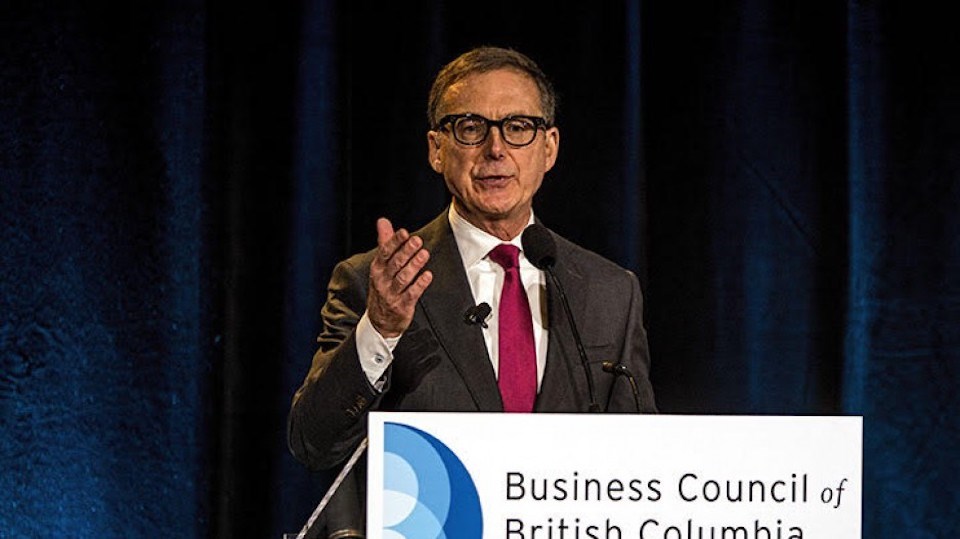Bank of Canada (BOC) governor Tiff Macklem today defended his Dec. 7 move to raise the country's policy interest rates by 50 basis points, to 4.25 per cent, while also providing an outlook for the future.
"Our top priority is getting inflation back to the two-per-cent target," he said in a speech to the British Columbia Chamber of Commerce at the Fairmont Hotel Vancouver.
"By raising interest rates, we are trying to dampen demand so supply can catch up. That will bring the overheated economy back into balance, and inflation will come down."
Macklem said in a question-and-answer session after his speech that he believes interest-rate hikes take between 18 months and two years to filter through the economy, and he expects that inflation in Canada will decline to two per cent by late 2024.
The BOC's policy interest rate increase last week was the seventh in a row that Macklem announced at his central bank's meetings.
In March, when policy interest rates were 0.25 per cent, he made his first hike – a 25-basis-point increase to 0.50 per cent. He then increased Canadian policy interest rates by 50 basis points in each of April and June before opting for a full 100-basis-point hike in July. He then started to reduce the pace of his increases by adding a 75-basis-point hike in September, and 50-basis-point hikes in October and last week.
"We have increased interest rates rapidly both because inflation rose quickly and because the economy was overheating," Macklem said.
"Increasing rates rapidly to rebalance demand and supply, and to keep long-run inflation expectations anchored to our target, is our best chance of restoring price stability without a severe economic contraction."
Macklem sounded confident that he was on the right path.
"Domestic demand is slowing, and we expect growth in gross domestic product will be close to zero through to the middle of next year as the economy adjusts to higher interest rates," he said.
"This will relieve domestic price pressures, and inflation will come down."
His move to raise interest rates 50 basis points last week attracted some surprise in financial markets and criticism from some economists.
Simon Fraser University finance professor Andrey Pavlov told BIV that Macklem was being too aggressive in his hikes, and should have waited to see the full effects of his first six interest-rate hikes on reducing inflation, which reached a recent peak of 8.1 per cent in June, and has since declined to 6.9 per cent in October.
"They have gone too far," Pavlov said. "We have clear signs that the economy is slowing down."
Aside from broad predictions that inflation will eventually come down to the bank's two-per-cent target, thereby alleviating the need for future interest rate hikes, Macklem would not be specific about his future plans.
The BOC released a statement last week that hinted that it may wait to see the effect of interest-rate hikes on bringing inflation down before putting in place additional rate increases. It said its Governing Council "will be considering whether the policy interest rate needs to rise further."
That compares with a BOC statement in October that said that the bank's Governing Council "expects that the policy rate will need to rise further."
Macklem stressed that there will be a lot of data in the seven weeks between his Dec. 7 rate hike and late January, when he is next expected to say whether he will raise interest rates again. Making the decision on whether to raise interest rates again will depend on that data, he said.
He would not say whether the bank will clearly telegraph to the market in advance when it has decided that no more rate hikes are necessary.
"I'm not going to speculate on what we might do in the future," he said. "We're certainly telling Canadians how we see the economy. We're telling them what our outlook for inflation is, what the risks around that are for inflation and what we see the implications are for interest rates, but I'm going to leave any future decisions to the future."





